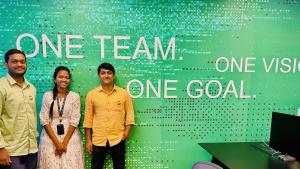It’s been a wild year, but we’re thankful that so many of our favorite annual conferences made the jump to the all-virtual format instead of outright canceling. Even though you can’t mingle face-to-face with colleagues and speakers, you still get a sense of the larger community overall and the pieces of wisdom that are passed down.
Hosted by the Cloud Native Computing Foundation (CNCF), KubeCon 2020—which was held virtually from November 17-20—featured a full lineup of keynotes and sessions aimed at DevOps, SREs, and developers from the cloud native open source community to advance Kubernetes, infrastructure modernization, and beyond.
After watching an array of talks, we wanted to highlight some of the more interesting moments and key points we found, which we’ve organized below in no particular order.
Before we get to our KubeCon 2020 list, though, some sad news regarding a longtime community colleague. Dan Kohn recently passed away all too soon. Dan was the former Executive Director of the CNCF and was a leader who will be missed. You can post a memory of Dan or offer your support here.
Use certifications to help grow your career
According to The Linux Foundation, 65% of companies are looking to hire more DevOps talent. This is up from 59% in 2018. Now, combine DevOps skills with cloud technologies and you improve your chances of landing that job as hiring managers are 70% more likely to hire someone with these skills. If you have the time, yesterday is the best time to start your certification path. Plus, this year there is a new certification: Certified Kubernetes Security Specialist and registration is open now. You can check out two blog posts regarding certification here: Kubernetes Certifications and AWS Certifications.
Apple has standardized on Kubernetes
In a keynote, entitled, “The Cloud Native Journey @ Apple,” Apple’s Alena Prokharchyk described what has happened since Apple standardized on Kubernetes: “All of [our internal] users want to adopt cloud native tools for better debugging, logging, monitoring, and tracing for their apps.” What we’re learning is that when you standardize on a technology, you can’t stop there. You need to go beyond just selecting your standard. You need to enable your employees with the tools that will help them succeed. When you give your employees the solutions they need, not just to code, but tools that allow them to gain full observability into their work, they will readily expand their use of these modern tools to make overall better quality software.
The state of Kubernetes is strong
According to David Sudia, Senior DevOps Engineer at GoSpotCheck, during his keynote, “More Power, Less Pain: Building an Internal Platform with CNCF Tools,” we learned we’ve now reached a happy medium between Kubernetes being not powerful enough and too complex. If you can think of a project, there are cloud native solutions that will help you fulfill your goals. Vendors have come a long way too, as Prometheus and others have brought much-needed observability to environments.
Why OpenTelemetry and why now?
Constance Caramanolis from Splunk gave a keynote with opening remarks about why OpenTelemetry is gaining traction right now. “The moment of observability is here,” she said during the talk. A benefit of OpenTelemetry is that it helps avoid vendor lock-in. Yes, this means that you’ll need to perform some updates to your environment. The good news? The OpenTelemetry Collector is your path to migration.
Access to education is improving
Ada Developers Academy is an awesome location to get your career going or improve your skills in cloud native technologies. Ada Developers Academy is a nonprofit, tuition-free coding school for women and gender diverse adults. It focuses on serving low-income people, underrepresented minorities, and members of the LGBTQIA+ community.
Adding to all the great options for self improvement during a time when many find ourselves at home more often, check out the free online training courses at KubeAcademy.
Think like a hacker
It’s been a wild year, but we’re thankful that so many of our favorite annual conferences made the jump to the all-virtual format instead of outright canceling. Even though you can’t mingle face-to-face with colleagues and speakers, you still get a sense of the larger community overall and the pieces of wisdom that are passed down.
Hosted by the Cloud Native Computing Foundation (CNCF), KubeCon 2020—which was held virtually from November 17-20—featured a full lineup of keynotes and sessions aimed at DevOps, SREs, and developers from the cloud native open source community to advance Kubernetes, infrastructure modernization, and beyond.
After watching an array of talks, we wanted to highlight some of the more interesting moments and key points we found, which we’ve organized below in no particular order.
Before we get to our KubeCon 2020 list, though, some sad news regarding a longtime community colleague. Dan Kohn recently passed away all too soon. Dan was the former Executive Director of the CNCF and was a leader who will be missed. You can post a memory of Dan or offer your support here.
Use certifications to help grow your career
According to The Linux Foundation, 65% of companies are looking to hire more DevOps talent. This is up from 59% in 2018. Now, combine DevOps skills with cloud technologies and you improve your chances of landing that job as hiring managers are 70% more likely to hire someone with these skills. If you have the time, yesterday is the best time to start your certification path. Plus, this year there is a new certification: Certified Kubernetes Security Specialist and registration is open now. You can check out two blog posts regarding certification here: Kubernetes Certifications and AWS Certifications.
Apple has standardized on Kubernetes
In a keynote, entitled, “The Cloud Native Journey @ Apple,” Apple’s Alena Prokharchyk described what has happened since Apple standardized on Kubernetes: “All of [our internal] users want to adopt cloud native tools for better debugging, logging, monitoring, and tracing for their apps.” What we’re learning is that when you standardize on a technology, you can’t stop there. You need to go beyond just selecting your standard. You need to enable your employees with the tools that will help them succeed. When you give your employees the solutions they need, not just to code, but tools that allow them to gain full observability into their work, they will readily expand their use of these modern tools to make overall better quality software.
The state of Kubernetes is strong
According to David Sudia, Senior DevOps Engineer at GoSpotCheck, during his keynote, “More Power, Less Pain: Building an Internal Platform with CNCF Tools,” we learned we’ve now reached a happy medium between Kubernetes being not powerful enough and too complex. If you can think of a project, there are cloud native solutions that will help you fulfill your goals. Vendors have come a long way too, as Prometheus and others have brought much-needed observability to environments.
Why OpenTelemetry and why now?
Constance Caramanolis from Splunk gave a keynote with opening remarks about why OpenTelemetry is gaining traction right now. “The moment of observability is here,” she said during the talk. A benefit of OpenTelemetry is that it helps avoid vendor lock-in. Yes, this means that you’ll need to perform some updates to your environment. The good news? The OpenTelemetry Collector is your path to migration.
Access to education is improving
Ada Developers Academy is an awesome location to get your career going or improve your skills in cloud native technologies. Ada Developers Academy is a nonprofit, tuition-free coding school for women and gender diverse adults. It focuses on serving low-income people, underrepresented minorities, and members of the LGBTQIA+ community.
Adding to all the great options for self improvement during a time when many find ourselves at home more often, check out the free online training courses at KubeAcademy.
Think like a hacker
This last item is something that we should all strive to think about first—security. Ian Coldwater, Duffie Cooley, Brad Geesaman, and Rory McCune conducted an outstanding security session entitled, “SIG-Honk AMA Panel: Hacking and Hardening in the Cloud Native Garden.” Some of their advice: From a security standpoint, you need to think like a hacker. What tools and technologies are you leaving behind? Where are the holes you need to plug? Don’t get honked!
Ready to learn the fundamentals you need to know to effectively monitor Kubernetes deployments? Check out our guide.
Ready to learn the fundamentals you need to know to effectively monitor Kubernetes deployments? Check out our guide.
The views expressed on this blog are those of the author and do not necessarily reflect the views of New Relic. Any solutions offered by the author are environment-specific and not part of the commercial solutions or support offered by New Relic. Please join us exclusively at the Explorers Hub (discuss.newrelic.com) for questions and support related to this blog post. This blog may contain links to content on third-party sites. By providing such links, New Relic does not adopt, guarantee, approve or endorse the information, views or products available on such sites.


